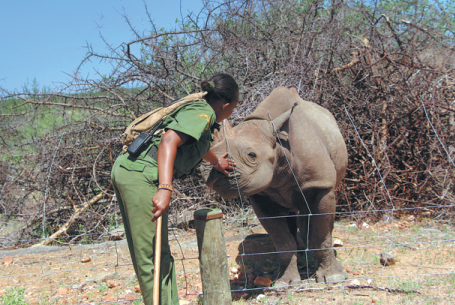Scourge of rhino poaching declines in South Africa, but takes hold in Namibia


There was a slight decline in rhinoceros poaching last year even as the illegal activity doubled in neighboring Namibia.
According to the country's Department of Forestry, Fisheries and the Environment, 448 rhinos were killed last year compared with 451 in 2021.
In Kruger National Park, the largest reserve in the country, 124 rhinos were killed for their horns last year, translating to a 40 percent decrease compared with those killed in 2021.
South Africa is home to the world's largest rhino population, with an estimated 16,000 rhinos living in the country.
Barbara Creecy, minister for the Department of Forestry, Fisheries and the Environment, attributed the rhino poaching decline in national parks to the dehorning program and the relentless war waged against poaching.
The World Wildlife Fund for Nature said the 40 percent decrease provides hope and important lessons regarding successful intervention for rhino security and also underscored the benefits of active dehorning programs in the park.
However, the organization raised concerns that the organized crime networks orchestrating the trafficking of rhino horns continue to move their targets onto important rhino populations in large conservation areas across the country.
KwaZulu-Natal Province recorded the highest number of rhino poaching last year, with 244 rhinos killed, more than double the number in 2021.
"We believe that if provincial authorities in KwaZulu-Natal follow our model, they will be able to significantly curb rhino poaching in their provincial parks before it is too late," Creecy said.
She said South African National Parks is in the process of identifying suitable safe habitats across South Africa to ensure survival of the rhino species.
While South Africa has recorded a decline in rhino poaching, neighboring Namibia has reported almost a doubling in rhino poaching.
According to Namibia's Ministry of Environment, Forestry and Tourism, 87 rhinos were killed for their horns last year, compared with 45 in 2021 and 43 in 2020.
Romeo Muyunda, the ministry's spokesperson, said rhino poaching remains a serious concern.
"The ministry and its partners in wildlife protection and law enforcement will step up efforts against wildlife crime in Etosha National Park particularly to curb rhino poaching," he said.
Research published by the University of Helsinki in Finland found that African rhino numbers are declining at unsustainable rates in core state-run parks, the reason being more than half the continent's remaining rhinos are now on private land.
edithmutethya@chinadaily.com.cn

































